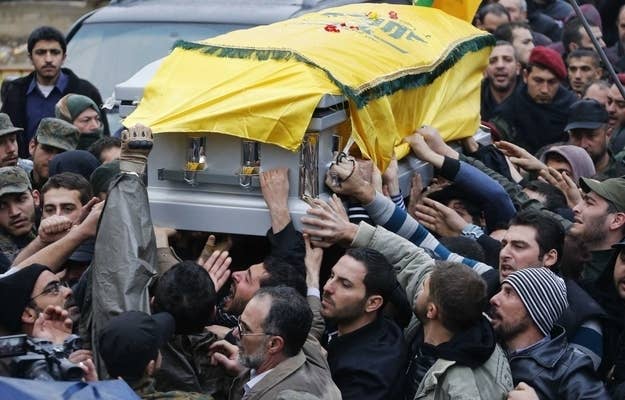
It was just around midnight when Hassan al-Laqis returned home to the middle-class neighborhood of Hadath, south-west of Beirut.
He had entered the parking lot of his building, but was still in his car when someone opened fire. In one version of stories Lebanese security officials have given to the newswires, the shooter was a single assassin with a silencer; in another version, a group of gunman fired from a nearby car. In either case, he was pronounced dead Wednesday morning in a nearby hospital.
Regional experts say that Laqis was the most important Hezbollah leader to be assassinated since 2008, when Imad Mughniyeh, a top Hezbollah military commander, was killed by a bomb that ripped through his car. His death, they said, was sure to have repercussions .
"Laqis was knowledgeable of and involved in all the organization's operational secrets – from the acquisition and development of advanced weapons to the establishment of classified communication systems to Hezbollah's operative plans," wrote Amos Harel, senior military correspondent for Haaretz. "His death strips Hezbollah of a 'intelligence source' – a person whose experience and widespread connections to Syrian and Iranian intelligence organizations served Hezbollah well for almost three decades."
Hezbollah was quick to blame Israel, which is widely believed to be behind past assassinations in Lebanon.
"The Israeli enemy tried to get to our martyr brother several times, in more than one location, but these attempts failed until this repugnant assassination," read a statement issued by the group.
But Israel issued a rare, explicit denial of its involvement in the assassination. "Israel had nothing to do with it," said Yigal Palmor, a spokesman for Israel's Foreign Ministry. Two defense officers contacted by Buzzfeed said that it wasn't an Israeli hit.
"There are no clearly defined sides in today's Middle East," an Israeli intelligence officer told Buzzfeed. "Did we, the Israelis do this? No. But did someone who has the same interests in us do this? Probably. Does that mean the enemy of my enemy is my friend? Maybe today for this assassination, but not tomorrow. Welcome to the Middle East."
Israel, of course, could still be behind the assassinations. Denying any involvement gave Israel enough plausible ambiguity to avoid a retaliation, Harel noted in Haaretz.
"The main purpose is to maintain a 'sphere of denial' which Israel has been using in recent years regarding all the activities attributed to it in Syria and Lebanon. The absence of an official announcement or denial creates a certain ambiguity for the other side. At the same time, it also enables it to refrain from an immediate response," he wrote.
In Beirut, Kemal Wazne, a Hezbollah specialist who runs the Center for American Strategic Studies, said that Hezbollah sees a link between Israel's interests and those of certain militant Islamist movements.
"There is obviously a coordination between the haters of Hezbollah and the Iranians — between the Saudis and the Israelis. Because they're both against Iran when it comes to the negotiations on the nuclear file, and they both have hostility to Iran and Hezbollah. So don't be surprised to see a lot of things meet at odd places."
Laqis' death was the most recent in a long line of assassinations and targeted bombings that have seen Lebanon return to battleground for regional proxy wars and score settling.
"This could be the beginning of a major assassination campaign against Hezbollah. And this could open the gate for more confrontation in the region," said Wazne. "There were the car bombings [this summer] in the suburbs of Beirut, and there was the bombing [last month] at the Iranian embassy. So these events are not coming separately."
The ongoing war in Syria, Lebanon's neighbor to the east, has seen a rise of new militant Islamist movements, some of them flush with cash from the Gulf. Regional experts say the groups could be keen to prove themselves as regional players by hitting targets in Lebanon.
One of those groups, the previously unknown the Free Sunnis of Baalbek Battalion, took responsibility for the assassination.
"Whoever it was must have known who they were hitting and why. He was a strategic, and not very obvious figure," said the Israeli intelligence officer, who admitted that Israel had previously attempted to assassinate Laqis in the 1990s.
While Laqis' official role was as head of Hezbollah's remote communication and technology network, he was thought to play a key liason role between Hezbollah and Iran, and was considered exceptionally close to Hezbollah chief Hassan Nasrallah. Iran is a key financial backer of Hezbollah
"This is someone who played a role in expanding Hezbollah's ties across the region, who supported their involvement in Syria," said one Israeli defense officer based near the northern border with Lebanon. "We didn't have reason to kill him now but others did.
On Tuesday night, shortly before Laqis was killed Nasrallah gave a three-hour television interview in which he blamed Saudi Arabia for propping up Al Qaeda units across the Middle East to fight for Saudi Arabia as proxies.
Nasrallah accused Saudi Arabia of being behind the bombing of the Iranian Embassy in Beirut two weeks ago, which killed 25 people and wounded more than 150.
He said that Riyadh had rejected repeated Iranian offers of talks, and was now making Iran "pay the price for the consequences of the failure of its plans in the region".
Nasrallah also gave a full account of Hezbollah's involvement in Syrian war, explaining that the group's involvement stemmed from fear of spillover into Lebanon.
"Should Syria fall into the hands of these armed groups, what will Lebanon's future be?" he said. "We went to Syria to defend all of Lebanon."
MIke Giglio contributed to this report.
